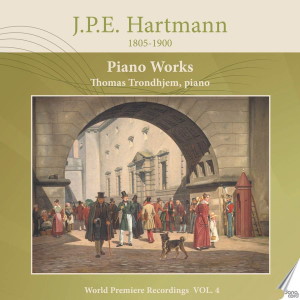
J.P.E. Hartmann (1805-1900)
Piano Works Volume 4
Sonata in D minor, Op.34 (1841)
Etudes Instructives, Op.53 (1851)
Piano Piece in B flat major, Op.26: Introduction and Andantino religioso (1840)
Three Genre Pieces (1841)
Piano Piece in C minor: “20th January 1848” (1848)
Piano Piece in E flat major: “Old Memories” (1841)
Thomas Trondhjem (piano)
rec. 2022, Concert Hall, Holstebro Music School and Music Academy, Denmark
DANACORD DACOCD950 [77]
In my earlier reviews of this cycle of J.P.E. Hartmann’s complete piano works (Volume 1 ~ Volume 2 ~ Volume 3), I wished for more musical commentary on each number. Volume 4 has largely met this wish, and I gratefully acknowledge that this information has helped prepare my review. I have not heard any of this music before. To my knowledge, no competing versions are available. I refer readers to my review of volume 1 for an overview of Hartmann’s life and works.
Sonata in D minor is a long piece, just over half an hour. The liner notes say that this was a Priis-Sonate (Prize Sonata), an entry in a competition organised by the Hamburg publisher Julius Ferdinand Georg Schuberth. Hartmann wrote it in great haste, but it still won joint second prize among more than fifty competitors. The notes are silent on who won first prize. Interestingly, the publisher later told Hartmann that “several members of the jury thought that [his] Sonata was not ‘pianistic’ enough.” Robert Schumann’s later glowing praise notwithstanding, I think the jurors may have had a point. The appropriate adjectives for much of this Sonata would be “charming”, “tender” and “graceful”. The third movement scherzo, at any rate, is an absolute gem with its balance of teasing and introspection. Schumann summed the sonata up: “[Hartmann] is a master of form and no slave of his emotions, and who all along the line understands how to move and captivate us.” The work captivates more than it moves. It is played here with allure and warmth.
The concise Etudes Instructives are once again captivating. They do not match Chopin’s studies for technical virtuosity. I would suggest that the Hungarian pianist and composer Stephen Heller is nearer the mark, with touches of Mendelssohn. The etudes are inventive and imaginative in the working out of the various piano figurations. The performance is crisp and precise.
No information is given about the Introduction and Andantino religioso, but the introductory notes to the score question the applicability of the word “religioso”. The piece may have been based on an organ improvisation made by Hartmann. It is an attractive example of salon music. Certainly the “clerical” part is anything but dour or po-faced.
The Three Genre Pieces can be construed as a sonata with three movements, or simply as character studies. They are pleasant to listen to, but do not inspire. The first and last are vibrant, and there is a reflective middle Allegretto giocoso. I have some sympathy with Hartmann’s putative publisher for these pieces (originally there were four) who felt that they were “dry”. They began to grow on me at a second hearing.
Two last two compositions carry subtitles. 20th January 1848 is an elegy on the death of King Christian VIII. This irregular work combines a little march, perhaps too jaunty for the situation, with a more funeral variation. Old Memories has an almost Celtic lilt to it. There is no suggestion as to what inspired this piece.
The booklet, in Danish and English, offers more detailed programme notes and a good overview of Hartmann’s life and achievement, as well as information about the soloist. It is well illustrated and features evocative period paintings of Copenhagen. The vibrant recording is faultless. Thomas Trondhjem is a splendid advocate for J.P.E. Hartmann. He brings technical skill, nuanced playing and academic erudition to these works. He is a pleasure to listen to.
I enjoyed this disc but I feel that it is very much a specialist market, appealing to enthusiasts of Danish music and romanticism. There is much of interest here, but no real masterpiece to get one’s teeth into. I am not sure how many more volumes of this series are projected, but I look forward to hearing further music by this interesting composer.
John France
Help us financially by purchasing through



















